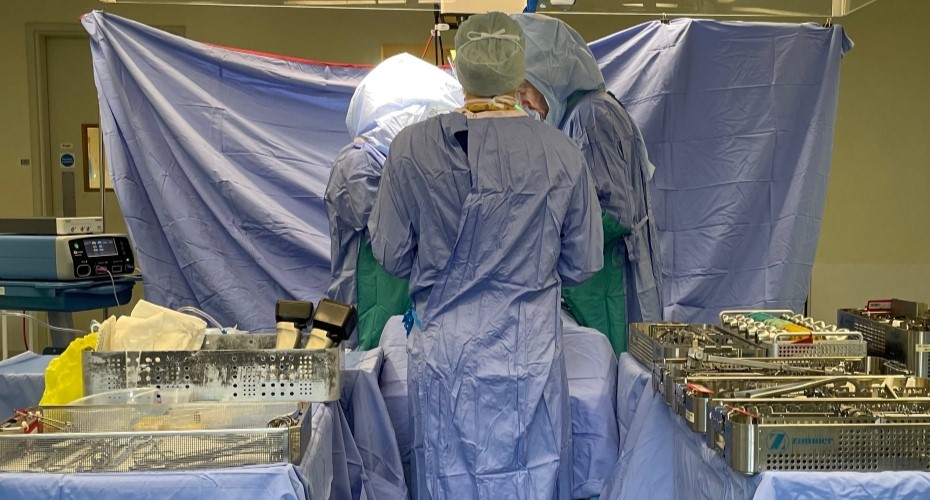Circular economy for NHS is crucial to achieving net zero and cost savings

Reusable medical gowns in action. Image: Revolution ZERO
The NHS must phase out single-use medical products and commit to reusing and remanufacturing equipment to address its net zero targets and reduce costs, a new report shows.
The MedTech Spotlight Report – a comprehensive roadmap to accelerating circular economy adoption in healthcare – focuses on the medical technology sector, which consists of around 500,000 medical products, from walking aids to advanced imaging equipment.
It outlines the challenges facing the UK health and social care sector – from global supply chain volatility to material scarcity, decarbonisation targets, tightening budgets, growing patient demands, healthcare disparities and escalating waste production – and concludes that “business as usual” is no longer possible.
The report details how a circular economy, where waste is designed out of the lifecycle of a product, and products and materials are maintained, reused and remanufactured where possible, can address systemic health system challenges while delivering the transformative change necessary to reach net zero.
Circular approaches go beyond recycling, offering innovative solutions to systemic challenges affecting UK health and social care sector and its suppliers, with benefits such as greater material security, resilient supply chains, job creation, reduced operational costs and positive environmental and social impacts.
The report highlights successful examples of initiatives that prove the business case of a circular economy and its potential to save the NHS hundreds of millions of pounds, while delivering significant carbon savings, driving private sector innovation and future profitability, fulfilling government policy commitments and protecting patient safety and clinical outcomes.
These include reusable surgical gowns, operating theatre drapes and other PPE items, produced by medical textiles start-up Revolution-ZERO to tackle the huge amount of waste in the NHS – 55,000 tonnes each year – generated from the disposal of single-use PPE items.
Revolution-ZERO has been working with Cornwall NHS since 2021 on delivering several world-first circular economy initiatives, including a modular processing unit to help supply sterile reusable surgical textiles for orthopaedic operating theatres in St Michael’s Hospital in Hayle, Cornwall.
It estimates that by switching to reusable PPE, a small NHS trust running 10 elective operating theatres 250 days a year can make annual savings of £83,000, cutting its greenhouse gas emissions by 222 tonnes and waste by 20 tonnes.
The report also looks at how devices such as harmonic shears – used in minimally invasive abdominal surgery – have been successfully remanufactured and placed back into supply stock by the German medical manufacturing company Vanguard, which collects used devices and puts them through several remanufacturing stages including cleaning and disinfecting, component tests to guarantee safety and functionality, and sterilisation in line with industry standards.
The company currently supplies 35 hospitals in the UK, including Leeds Teaching Hospitals Trust, which in 2022 was able to divert 70kg of used devices from waste, saving an estimated £73,800 and reducing its greenhouse gas emissions by 285kg.
The financial implications for NHS England if rolled out nation-wide could be considerable, with the report estimating savings of £9.7 million by 2030 on a procurement spend of £100 million as a best case scenario.
The report emphasises the vital role of leadership and collaboration to enable the widespread systemic transition to a circular economy.
Its key recommendations include the creation at policy-level of a practical roadmap for change, and the development of circular economy education programmes for UK health and social care professionals that would form part of core training.
Professor Peter Hopkinson, Co-director of the National Interdisciplinary Circular Economy Research (NICER) programme’s CE-Hub at the University of Exeter, said: “A circular economy offers a tangible solution to the systemic challenges faced by the UK medical technology sector.
“Our report identifies pain points and opportunities, and presents comprehensive recommendations to drive sustainable innovation and address the systemic challenges shaping the future of healthcare provision in the UK.”
Professor Fiona Charnley, Co-director of the NICER CE-Hub, added: “Achieving a circular medical technology system within the UK needs to be a priority, but it requires clear leadership and collaborative forward-looking actions from all stakeholders throughout the value chain.”
“To make this a reality, we identify recommendations for five key stakeholder groups: regulators and policymakers, industry and supply chain, clinicians and patients, healthcare providers and NHS, and academics and research partners.”
The MedTech Spotlight Report: Accelerating Circular Economy Adoption, is available here.



